
Trends
- The top attacker country was China with 1809 unique attackers (25%).
- The top Exploit event was Authentication with 46% of occurrences.
- The top Trojan C&C server detected was TrickBot with 21 instances detected.
Top Attacker by Country
| Country | Occurrences | Percentage |
|---|---|---|
| China | 1809 | 25.01% |
| United States | 1658 | 22.93% |
| Vietnam | 478 | 6.61% |
| Brazil | 386 | 5.34% |
| France | 336 | 4.65% |
| Republic of Korea | 325 | 4.49% |
| India | 321 | 4.44% |
| Russian Federation | 317 | 4.38% |
| United Kingdom | 232 | 3.21% |
| Egypt | 208 | 2.88% |
| Canada | 170 | 2.35% |
| Thailand | 157 | 2.17% |
| Taiwan | 143 | 1.98% |
| Singapore | 142 | 1.96% |
| Germany | 140 | 1.94% |
| Netherlands | 123 | 1.70% |
| Indonesia | 112 | 1.55% |
| Australia | 98 | 1.36% |
| Italy | 77 | 1.06% |
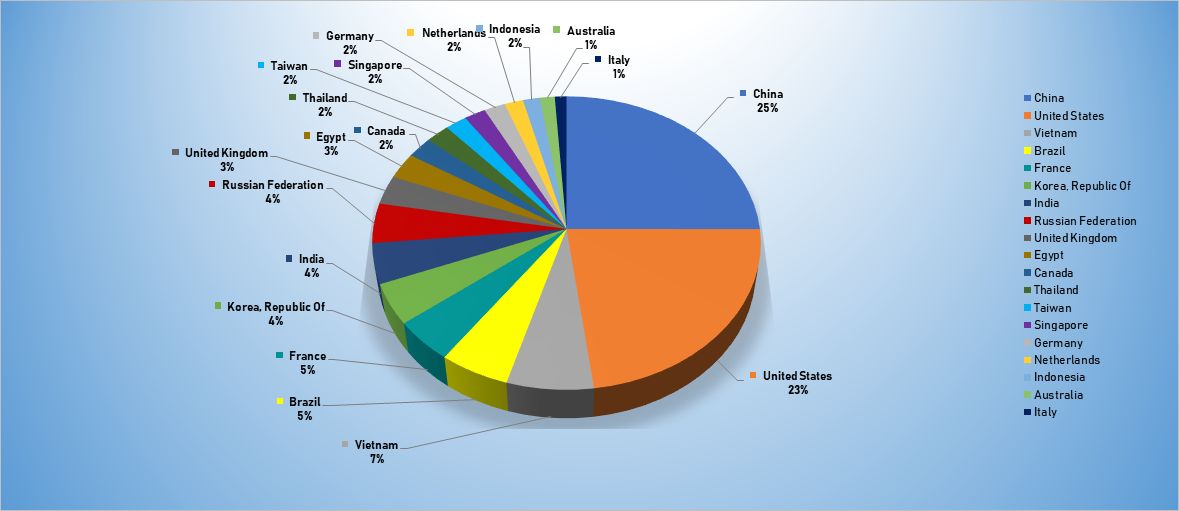
Threat Geo-location
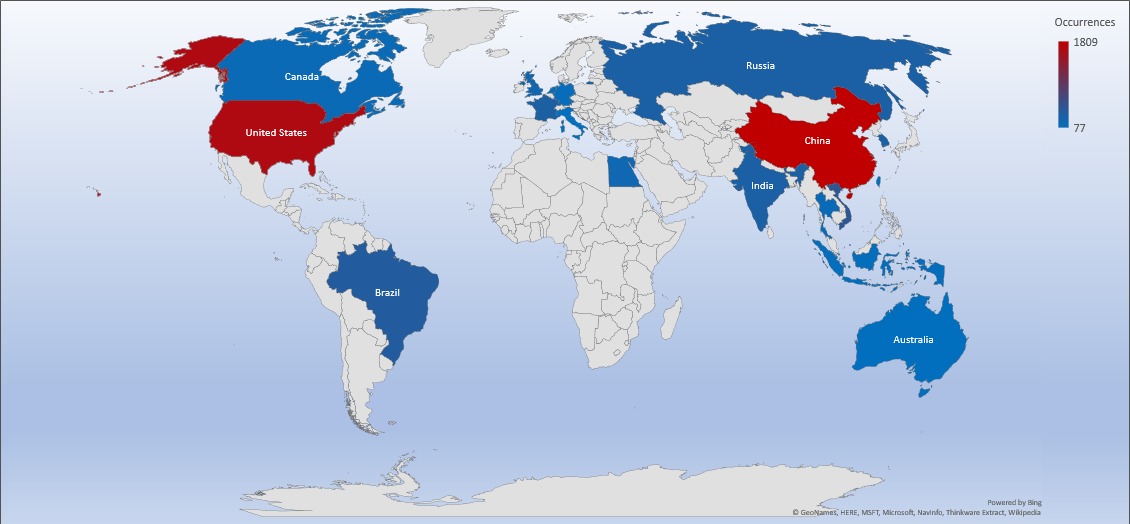
Top Attacking Hosts
| Host | Occurrences |
|---|---|
| 1.128.109.7 | 1224 |
| 1.132.106.92 | 629 |
| 1.217.98.44 | 577 |
| 1.56.207.131 | 487 |
| 1.203.115.140 | 483 |
| 1.132.106.152 | 346 |
| 1.235.192.218 | 263 |
| 1.132.106.64 | 231 |
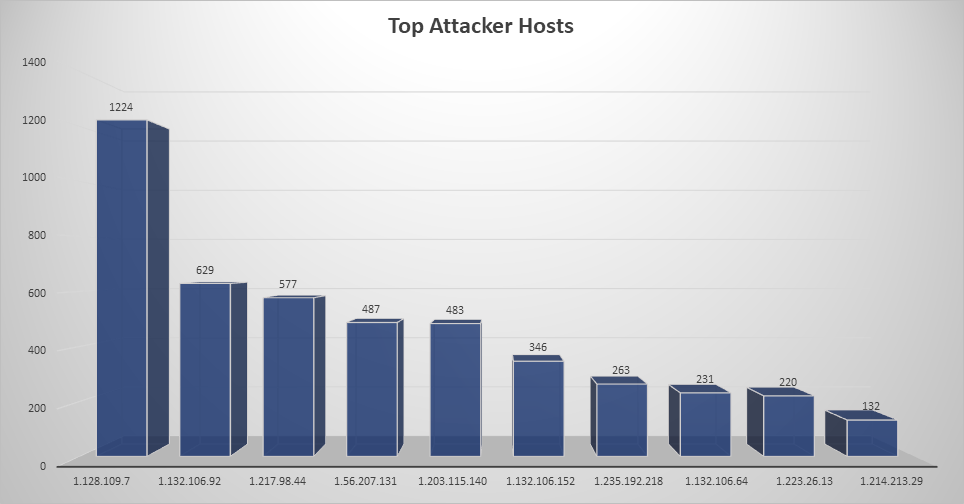
Top Network Attackers
| Origin AS | Announcement | Description |
|---|---|---|
| AS1221 | 1.128.0.0/11 | Telstra |
| AS3786 | 1.208.0.0/12 | LG DACOM Corporation |
| AS4837 | 1.56.0.0/13 | China Unicom Heilongjiang province net |
Top Event NIDS and Exploits
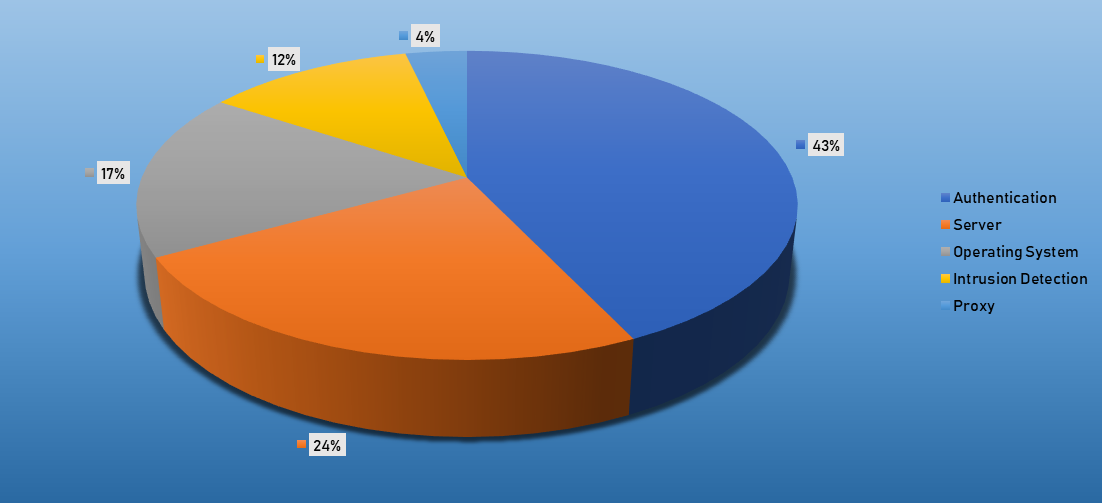
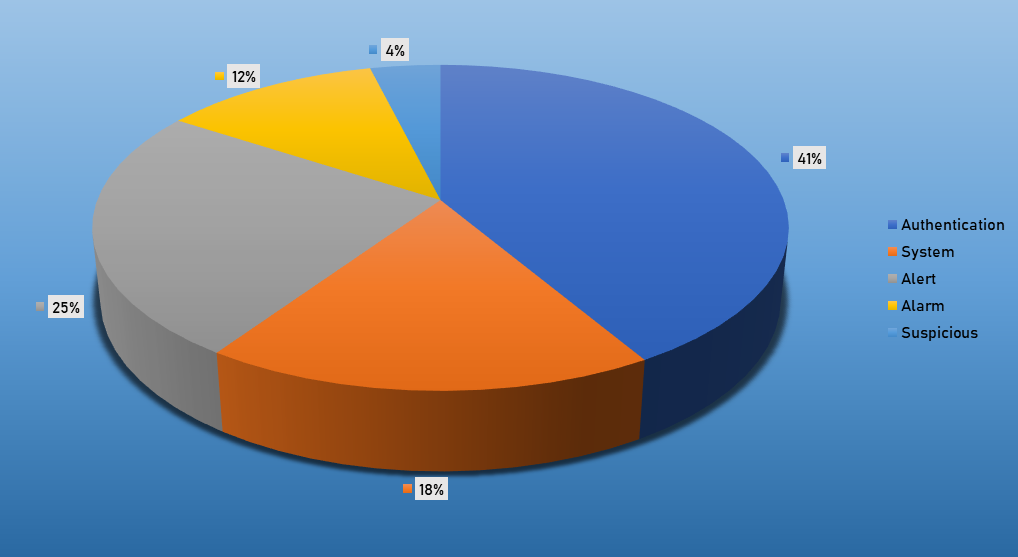
Top Alarms
| Type of Alarm | Occurrences |
|---|---|
| Bruteforce Authentication | 2294 |
| Network Anomaly | 2695 |
| Network Discovery | 8 |
Comparison from last week
| Type of Alarm | Occurrences |
|---|---|
| Bruteforce Authentication | 3846 |
| Network Discovery | 995 |
| Network Anomaly | 131 |
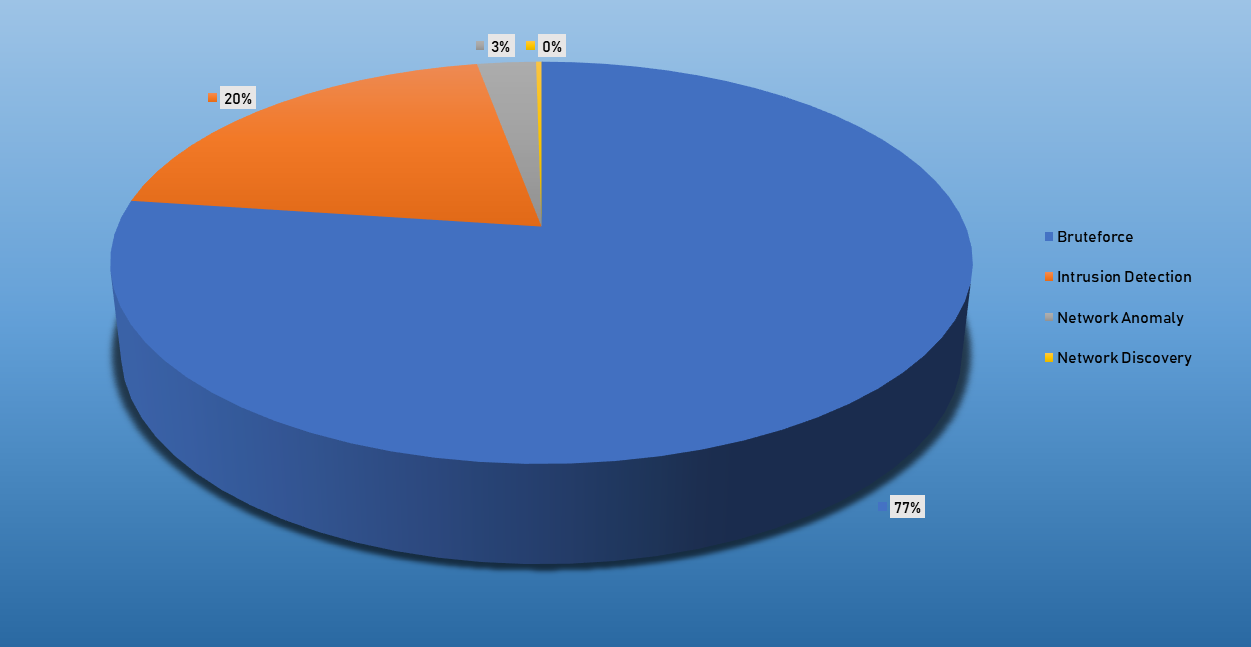
Remote Access Trojan C&C Servers Found
| Name | Number Discovered | Location |
|---|---|---|
| Anubis | 1 | 130.0.235.205 |
| Azorult | 4 | 176.119.159.153, 62.109.17.122, 194.67.90.196, 47.88.102.244 |
| CryptBot | 2 | 62.173.154.208, 37.140.199.197 |
| Kpot | 1 | 85.143.217.98 |
| LokiBot | 5 | 101.99.90.11, 47.88.102.244, 194.67.90.196, 149.154.69.146, 194.209.228.127 |
| LaturoStealer | 1 | 176.121.14.128 |
| PredatorTheThief | 2 | 185.25.50.227, 47.88.159.181 |
| TrickBot | 21 | 195.123.237.52, 85.217.171.98, 185.183.98.237, 54.38.127.24, 79.124.49.203, 81.177.6.144, |
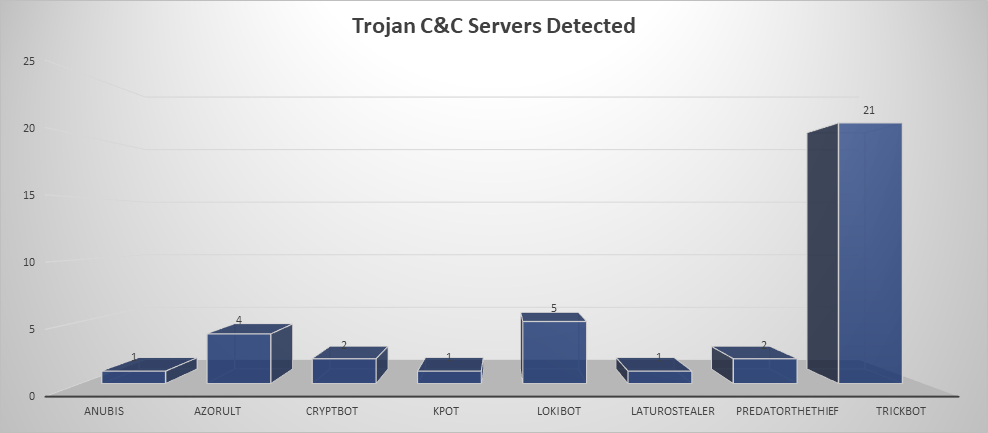
Common Malware
| Malware Type | MD5 | Typical Filename |
|---|---|---|
Win.Trojan. | 47b97de6 | qmreportupload.exe |
W32.7ACF7 | 4a50780 | xme64-2141.exe |
W32.1755C | c785a8b | cslast.gif |
W32.46B2 | db69eaa ea4d497 03f161c8 1e6fdd036f | invoice.exe |
W32.093CC | 3c7be1d | sayext.gif |
CVEs For Which Public Exploits Have Been Detected
ID: CVE-2019-11510
Title: Pulse Secure Arbitrary File Disclosure Vulnerability
Vendor: Pulse Secure
Description: Pulse Connect Secure is exposed to arbitrary file disclosure vulnerability. An attacker can exploit these issues to access arbitrary files in the context of the application, write arbitrary files, or can send a specially crafted URI to perform an arbitrary file reading vulnerability .
CVSS v2 Base Score: 6.5 (AV:N/AC:L/Au:S/C:P/I:P/A:P)
ID: CVE-2019-8605
Title: Apple MacOS Information Disclosure Vulnerability
Vendor: Apple
Description: A remote attacker could exploit this vulnerability to cause disclosure of information, unauthorized modification and arbitrary code execution with system privileges. A malicious application may be able to execute arbitrary code with system privileges," reads the advisory published by Apple. "A use after free issue was addressed with improved memory management." The vulnerability was initially reported by Google Project Zero white hacker Ned Williamson, who also published an exploit for iOS 12.2, dubbed "SockPuppet," after the first patch was released.
CVSS v2 Base Score: 9.3 (AV:N/AC:M/Au:N/C:C/I:C/A:C)
ID: CVE-2019-12527
Title: Squid Buffer Overflow Vulnerability
Vendor: Squid
Description: Squid is exposed to a heap based buffer overflow vulnerability because the application fails to properly bounds-check user-supplied data before copying it into an insufficiently sized buffer.When checking Basic Authentication with HttpHeader, Squid uses a global buffer to store the decoded data. Squid does not check that the decoded length is not greater than the buffer, leading to a heap-based buffer overflow with user controlled data. Successfully exploiting this issue allow attackers to execute arbitrary code in the context of the affected application.
CVSS v2 Base Score: 6.8 (AV:N/AC:M/Au:N/C:P/I:P/A:P)
ID: CVE-2019-15107
Title: Webmin Unauhenticated Remote Command Execution Vulnerability
Vendor: Webmin
Description: Webmin is exposed to a vulnerability that allows remote command execution. The parameter old in password_change.cgi contains a command injection vulnerability. Webmin versions are only vulnerable if changing of expired passwords is enabled. Successful exploitation may allow remote attacker to execute arbitrary commands on target system.
CVSS v2 Base Score: 10.0 (AV:N/AC:L/Au:N/C:C/I:C/A:C)
ID: CVE-2019-15092
Title: Wordpress Plugin Remote code Execution Vulnerability
Vendor: WordPress
Description: Wordpress Plugin is exposed to CSV injection vulnerability. This allows any application user to inject commands as part of the fields of his profile and these commands are executed when a user with greater privilege exports the data in CSV and opens that file on his machine. The webtoffee "WordPress Users & WooCommerce Customers Import Export" plugin 1.3.0 for WordPress allows CSV injection in the user_url, display_name, first_name, and last_name columns in an exported CSV file created by the WF_CustomerImpExpCsv_Exporter class.
CVSS v2 Base Score: 7.2 (AV:L/AC:L/Au:N/C:C/I:C/A:C)
